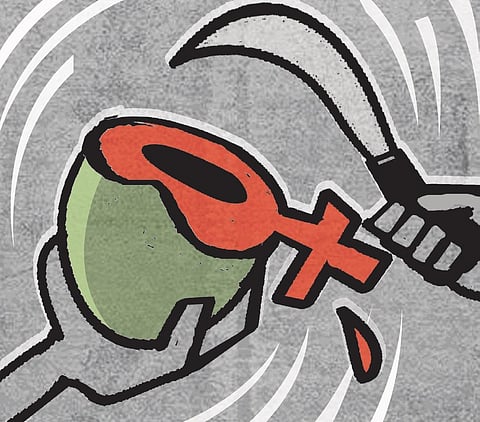

Even as Kerala tops the list on the human development, literacy, low infant mortality, high life expectancy indices, it remains at par if not worse than other states in one respect: the disrespect of women. The empowerment of Malayali women has been slowly eroding over the years, and this sits ill with the notions if not the principles of matriarchy.
Strictly speaking, as pedants will be quick to point out, the system followed by some communities in Kerala is matrilineal, not matriarchal. Matriarchal denotes a form of social organisation in which a woman is the head; matrilineal lineage is based on kinship with the mother or the female line. Just why am I going back to god’s own country, right now? Well, because of the recent horrifying deaths of three young women there. All the cases involved physical abuse, mental trauma, and resulted in death. All are prime indicators of something rotten in the state of affairs in Kerala: the disrespect of women and the demand for dowry.
The dowry topic deserves a piece all its own. Let’s look at the disrespect of women in a society where many sections are matrilineal. Is this just a piece of irony or is it an inevitable run-off in a country that flaunts its patriarchy with muscle and toxic pride?
This disrespect, some of us will tell you, is a bad fit with what most Malayalis have grown up hearing, absorbing, believing. That the state values women in ways the rest of the country does not. That most Malayali women are a breed apart, who inherit homesteads and land, adroitly run enterprises private and commercial, and are not called upon to cover their heads in society.
There are households of my Nair community which still hand over the ancestral house to the daughters along with the heirloom jewellery, after running it by the sons, of course. I know of clans where the birth of a daughter is still celebrated with more fervour than those of sons. I know of a family with all sons and no daughters, and many a glance of pity went their way; their line ends with the mother of the sons, because the next generation would take on the family name of the women who’d marry those sons. Then again, the privileging of sons over daughters has made a steady creep into those very households over the years, no gainsaying that.
And then, the rampant misogyny. Many of us were appalled at the abuse suffered by a young Malayali actor some years ago. There was talk of a contract out on her by her senior male colleague, which was all the more shocking. And yet, several people feel the suspect is innocent of all charges, that it was a land deal gone bad (like that calls for abuse!) and that—wait for this—the victim was a ‘bold’ woman. Implying what exactly? That she was asking for it?
Many of us haven’t forgotten the Suryanelli case, where a 16-year-old girl was kidnapped and raped repeatedly over a period of 40 days. Or the suicide by two young sisters (aged 13 and nine) from Palakkad, who had been subjected to sexual assault. Or the vicious attacks on the women who decided to go to Sabarimala, the trolling of a popular show host who wore what was seen as ‘provocative’ clothes, as well as that of a feisty female actor who took on the hidebound patriarchy in the Association of Malayalam Movie Artistes.
These are cultural practices that have come in from outside Kerala, an old ammooma told me recently. And I laughed. Nothing takes root anywhere unless it’s on fertile ground. So even as we cheer women with agency in Malayalam films like The Great Indian Kitchen, Kumabalangi Nights and Mayanadi, it would be foolish to believe that those characters are an absolute, on-the-ground representation of Malayali women.
But the flip side is a heartening one. Like several other states across the country, Kerala too sees determined women frequently rise up to take on the establishment boldly, unflinchingly, women who stay the course till some kind of reform is put in place. More power to these women; the state sure needs them.
kumar.sheila@gmail.com.